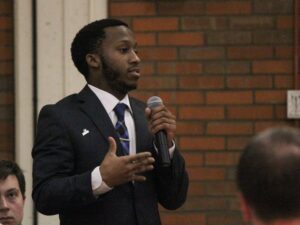by The Cowl Editor on February 17, 2017
News

by Daria Purdy ’19
News Staff
Diversity has been a flashpoint issue on the Providence College campus for the last year.
After an alleged incident against an African-American student at a party last year, students protested against the treatment and exclusion of people of color at PC.
Additionally, protest broke out last year following the publication of an article by Dr. Anthony Esolen that commented on what diversity means on a Catholic campus. Many students disagreed with the ideas Esolen put forth concerning diversity.
More recently, a solidarity walk occurred on campus to show support for immigrants affected by President Trump’s recent executive action. The issue of diversity has been contentious on the PC campus, and more recently, has been brought into the forefront as an issue in America as a whole.
The issue of diversity and Catholic identity were explored in an event that was part of the Difficult Dialogues Initiative that took place this Wednesday. The event was titled Six Views on Catholic and Dominican Identity and Contemporary Approaches to Diversity. An invitation to attend the dialogue was extended to all members of the Providence College community. Around 100 students, staff, faculty, and alumni attended the dialogue.
The dialogue was organized by the Office of Institutional Diversity, and was opened by remarks from PC President Fr. Brian Shanley, O.P.,. Shanley expressed the views of a conference of Catholic schools, that he recently attended in Washington, D.C., which explored “diversity as an expression of the grandeur of God.” Shanley said he wished to bring this idea and its implication back to the PC campus.
The talk opened with seven different speakers who addressed the question, What is the greatest challenge connecting Catholic and Dominican identity with contemporary understanding of diversity?
The first speaker was Dr. Patrick Breen, an associate professor of history. Breen told the story of a 19th century slave in North Carolina who was allowed to choose her own master. The slave chose a man she knew from church, believing that his faith would make him a good master.
Instead, Breen recounted how this slave master did not provide for the basic needs of his slaves. Breen pointed out how the master’s faith was insufficient, and how it demonstrated the “complex and sometimes paradoxical nature of humans.” Breen believes that it is important to keep this aspect of human nature in mind when discussing diversity.
The next speaker was Michael Bartels ’18, president of the history club. Bartels detailed the current political climate of America and how it related to ideas about diversity. Bartels believes that the current trend in politics to attack the supporters of a political figure has lead to a need to defend one’s identity instead of a search for truth. Many people believe themselves to be “inevitably right,” and do not open themselves up to understand the worldview of others.
The next speaker, Dr. Jennifer Illuzzi, associate professor of history, emphasized the need to create a new story for PC, one that takes into account all its diversity and history. Illuzzi pointed out that one needs to confront the darker aspects of the history of Christianity, along with recognizing the liberating message of the Gospel.
The fourth speaker was Nicholas Sailor ’17, who contrasted the difference between the ideals of Catholic thought and the practical challenges of implementing it. He also expressed his worry about the void of support he has found in his effort to confront and explore issues of diversity.
Dr. Matthew Cuddeback, assistant professor of philosophy, then tackled the issue of the place of LGBTQ people at a Catholic institution. He pointed out the fact that the Church has clear teachings against homosexual relations, and stated that PC needs to confront its relationship to these ideas.
Tiffany Gaffney, assistant dean of students, also addressed the issue of LGBTQ students. Gaffney insisted on love as a starting point for such dialogue; she said it important to make LGBTQ students feel loved, first and foremost, and then work through challenges from that starting point.
Finally, Rev. Nicanor Austriaco, O.P., professor of biology and theology, described how the experience of being discriminated against changed the way that he thought. He described discrimination as a “habituation of the soul,” and said that experiences of marginalization can change one’s worldview.
After the speakers had concluded, participants were broken into small groups to discuss what had been said.
Some of the questions that the small groups encountered included: Does PC have a lack of consensus about its Catholic identity? Should PC aspire to be all things to all people? Does everyone on campus have a clear understanding of what the Catholic and Dominican mission is?
All these questions will need to be addressed moving forward, as PC struggles to reconcile its Catholic identity to a growing desire for and presence of diversity.